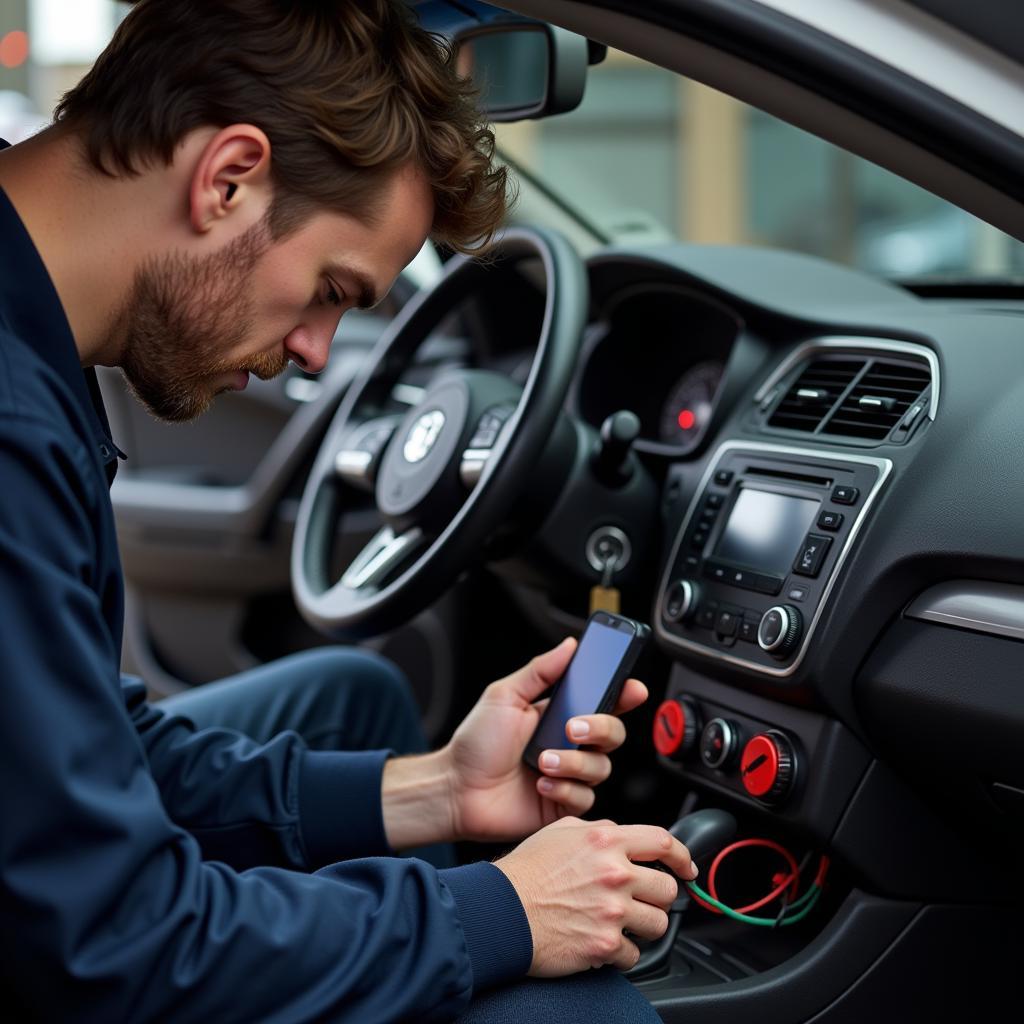Remote car starters are a popular convenience, especially in harsh climates. However, when they malfunction, it can be frustrating and leave you stranded. This guide will walk you through some of the most common Problems With Remote Car Starters and provide troubleshooting tips to get you back on the road quickly.
Understanding the Basics of Remote Car Starters
Before we delve into troubleshooting, let’s briefly discuss how remote car starters work. These systems consist of three main components:
- Transmitter (Key Fob): This is the device you use to send a start signal to your car.
- Receiver: Located in your car, this component receives the signal from the transmitter.
- Vehicle Interface Module: This module interprets the signal from the receiver and interacts with your car’s electrical system to start the engine.
A malfunction in any of these components can lead to problems with your remote starter.
Common Problems with Remote Car Starters and Their Solutions
Here are some of the most frequent issues you might encounter:
1. Remote Starter Won’t Start the Car
This is the most common problem, and there are several potential culprits:
- Dead Key Fob Battery: The simplest solution is often the most likely. Replace the battery in your key fob and try again.
- Weak Car Battery: A remote starter needs sufficient power from your car battery to function. If your car battery is weak or dying, the remote starter might not work.
- Programming Issues: Sometimes, the remote starter can lose its programming, particularly after a car battery disconnect. Consult your owner’s manual or contact a professional for reprogramming instructions.
- Faulty Receiver or Vehicle Interface Module: If other solutions fail, there might be a problem with the receiver or the vehicle interface module. This requires professional diagnosis and repair.
2. Remote Starter Range is Limited
Experiencing a shorter-than-usual range with your remote starter? Here’s what could be causing it:
- Transmitter Battery: A weak battery in the transmitter can weaken the signal. Replace the battery first.
- Antenna Interference: Radio frequency interference from other devices, such as cell phones or Wi-Fi routers, can disrupt the signal. Try using your remote starter away from potential sources of interference.
- Receiver Location: The receiver’s location in your car can affect the range. If it’s blocked by metal components, the signal might be weaker. Consider relocating the receiver if possible.
3. Remote Starter Starts and Then Stops Immediately
This problem usually indicates an issue with the vehicle’s security system:
- Immobilizer System: Modern cars have immobilizer systems that prevent unauthorized starting. If your remote starter isn’t properly integrated with the immobilizer, the engine might start and then immediately shut off. A professional installer can resolve this.
- Faulty Hood Pin Switch: Many remote starters have a safety feature that prevents starting if the hood is open. A faulty hood pin switch can trigger this safety feature even when the hood is closed.
4. Remote Starter Works Intermittently
Intermittent problems can be difficult to diagnose, but here are some possibilities:
- Loose Connections: Check all the connections between the remote starter components, including the transmitter, receiver, and vehicle interface module. Loose connections can cause intermittent operation.
- Temperature Extremes: Extreme temperatures can affect the performance of electronic components. If you experience problems only during very hot or cold weather, this could be the culprit.
- Internal Component Failure: Over time, components within the remote starter system can fail. This might require replacement of the affected component.
 Car Mechanic Troubleshooting Remote Starter
Car Mechanic Troubleshooting Remote Starter
Tips for Preventing Remote Car Starter Problems
Prevention is always better than cure. Follow these tips to minimize the chances of encountering issues:
- Regular Battery Replacement: Replace the batteries in your key fob regularly, even if they seem to be working fine.
- Professional Installation: Always have your remote starter installed by a reputable and experienced professional.
- Regular Maintenance: Just like any other car system, your remote starter benefits from periodic checks.
- Consult Your Owner’s Manual: Your car and remote starter manuals contain valuable information on troubleshooting and specifications.
“Remote starters offer unparalleled convenience, but neglecting their maintenance can lead to frustrating issues,” says John Smith, a seasoned automotive electrician with over 20 years of experience. “Regular checks and timely repairs are crucial to ensure your remote starter functions flawlessly.”
When to Seek Professional Help
While some problems can be solved with basic troubleshooting, others require professional expertise. Don’t hesitate to contact a qualified automotive electrician if:
- You’ve tried the basic troubleshooting steps without success.
- The problem is intermittent and difficult to diagnose.
- You suspect a problem with the vehicle’s electrical system or security features.
- You’re uncomfortable working with car electronics.
Conclusion
Remote car starters can greatly enhance your driving experience, but problems can arise. By understanding the common issues and following the troubleshooting tips outlined in this guide, you’ll be better equipped to address them effectively. However, remember that professional help is always recommended for complex electrical problems.
For expert assistance with your remote car starter or any other automotive electrical issue, contact the professionals at AutoTipPro at +1 (641) 206-8880 or visit our office located at 500 N St Mary’s St, San Antonio, TX 78205, United States. We’re here to help you get back on the road with confidence.





Leave a Reply